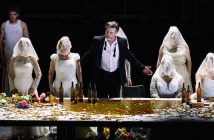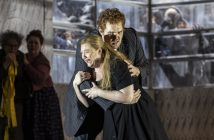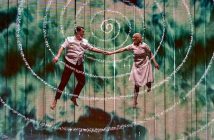I’ve always found Fidelio a strange story, really. A prison warden’s daughter, Marzelline, loves the eponymous hero, and ignores the flirtatious nature of the prison gatekeeper, Jaquino. Marzelline, however, does not suspect that Fidelio is actually Leonore, who has disguised herself as a man to get access to her incarcerated husband, Florestan. To complicate matters, the warden, Rocco, is impressed with Fidelio and backs his daughter Marzelline’s designs on him/her. Fidelio persuades Rocco to let her/him help him/him in prison work. In doing so Rocco tells her/him about a mysterious political prisoner whom he has been starving at the orders of the Governor, Don Pizarro – this mysterious prisoner being none other than Florestan, Leonore’s husband. But Don Pizarro has wrongly imprisoned Florestan and, to cover his misdemeanour, plans to murder him, and asks Rocco to carry out the murder. Still with me?
That’s just the first act.
In this first revival from the Royal Opera House, the sets of both scenes, while busy, were used to great effect although, I confess, I didn’t fancy the direction; it seemed to lack continuous pace. When the singing stopped the action remained static and, once the song was back in full flow, while the action became much more intense, the pace of the story slowed and, alas, so did my interest.
Still, once the curtain rose on the second act, faced with the striking set of Florestan’s dungeon and hearing Endrik Wottrich emerge from the darkness in fine voice with his opening aria, I couldn’t help but be drawn in. I’ll spare the detailed synopsis but, suffice to say, the proverbially thickening plot as Pizarro’s plan to kill Forestan reaches its dénouement culminates in the customary identity revelation by Leonore, freedom for Florestan, flight for Pizarro, a reuniting of husband and wife, shame and ignominy for Rocco and a disappointed, even cheated, Marzelline. Not all is fair in love and Beethoven.
With expectations from a Royal Opera production being so high, unfortunately the scope for criticism becomes more opportune. Throughout the entire production I found there were many awkward moments, the drama becoming still and slow. And while there were some great individual performances from Elizabeth Watts, Nina Stemme and Kurt Rydl, the trio singing was poor; it was under-rehearsed and erratic. While conductor Mark Elder was evidently trying hard to keep it together, it was unfortunately not to be. But, on the brighter side, the orchestra of the Royal Opera was divine. Beethoven’s score is imbued with emotion and brio in equal measure and it was served admirably with plenty of punch and passion from the pit.
Having only played through various parts of the score as a student, I’ve never previously had an opportunity to hear Rimsky-Korsakov’s The Tsar’s Bride as a completed work before. However, hearing it for the first time I have to say what an excellent addition this was to the Royal Opera repertoire. I simply love how, well, Russian the music is; the devastatingly gorgeous score with surging climaxes and the romantic melody throughout were punctuated with beautiful, if blatant, hints of Russian folk music beaming from the pit. And it worked a treat.
Paul Curran, director of the Norwegian National Opera, helmed this new production, never seen before at Covent Garden. And returning to the Royal Opera for a third time in the season, Mark Elder led an almost entirely Russian cast in this premiere at Covent Garden.
As a new production it evoked a dark and threatening world with a contemporary setting that sees the infamous Ivan the Terrible select Marfa Sobakin as his bride. Romantic and political jealousy and scheming bring death, misfortune and disaster. The story opens in a restaurant (depicted here as an American diner) with the villain Grigory (the wonderful Johan Reuter) giving a recitative and aria lamenting his love for Marfa, the merchant Sobakin’s daughter, in spite of his attachment to Lyubasha. A stunning performance from Ekaterina Gubanova as a lusting Lyubasha, her jealousy and curiosity all mirrored by her striking red gown, literally reverberated around the House as she exacted retaliation to Grigory’s lasciviousness.
The exemplary performances were coloured beautifully by tenor Dmitry Popov, as Marfa’s suitor, Lykov, who glided effortlessly through the opera as the young revolutionary and romantic – although I’d question whether his attention-seeking finish in Act III, where he commanded applause from the audience by flinging his arms in the air, was completely necessary. Rounding up the fated love triste, cast mentions must include Marina Poplavskaya performing a convincing Marfa, with great depth of characterisation from Act II through to her disillusionment and poisoning in Act IV – although, poisoning aside, she should have had some water between acts as her top notes were as crazy as her character. The performance by the chorus of the Royal Opera was truly awesome, particularly the men but, indeed, the whole chorus provided another wonderful performance to accompany this fantastic cast of singers.
The only thing slightly remiss in this production – and I’m not simply saying this for the sake of it – was that the sets did not complement the singing or direction, unfortunately. The set-per-act arrangement, though admirable, on the whole did not meet the Royal Opera’s usual standard. Perhaps I’m just spoiled.
Still, I’m looking forward to this production’s revival in the future…
If you missed these live at the Opera House, you can hear them broadcast on BBC Radio 3 this month. The Tsar’s Bride, Saturday June 11th at 6pm, and Fidelio, Saturday June 25th at 6pm.
Fidelio production image © The Royal Opera / Catherine Ashmore
The Tsar’s Bride production image © The Royal Opera / Bill Cooper




